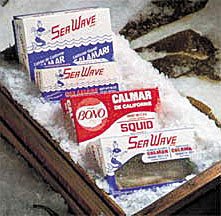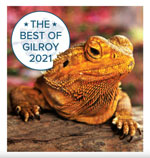Garlic Festival attendees may notice a few environmentally
friendly changes this year, ranging from compostable cutlery to
more local sources.
Garlic Festival attendees may notice a few environmentally friendly changes this year, ranging from compostable cutlery to more local sources.
It’s all part of a new effort to “go green” as the Garlic Festival pushes for policies that are less harmful to the planet, festival officials say.
Staff members are celebrating the theme by wearing light-green shirts, and the Garlic Festival logo also is sporting a viridescent hue.
“The idea of sustainability is not an original one by me or the Garlic Festival,” Garlic Festival President Greg Bozzo said. “That’s the direction that people who are interested in food are going. I believe that it either makes sense to go with the trend or be ahead of the trend.”
Bozzo noted that the Garlic Festival started with a local-regional approach when it started, noting that maintaining a local focus is a key component of sustainability.
Sustainability traditionally refers to strategies that meet society’s modern needs without hurting future generations, according to the U.S. Environmental Protection Agency. Along those lines, the Garlic Festival Association is encouraging vendors to use more sustainable products, while offering earth-friendly cutlery along Gourmet Alley.
Sporks (spoons with fork-like prongs) and cups that will be available are made of cellulose, an organic plant-based material. Products from Minnesota-based Natur-Tec, which manufactures those items along with compostable trash bags used at this year’s festival, can be found at various venues ranging from the Minnesota State Fair to AT&T Park in San Francisco, Natur-Tec vice president Vineet Dalal said.
Dalal described the West Coast as a hub of environmental awareness, where recyclables and organic waste, such as food and plant clippings, are separated from the normal trash. Organic waste can turn into methane when it is thrown into a landfill and is covered, making it devoid of oxygen, he said. As a result, green waste should be separated and placed in a compost pile, Dalal said, a practice that will be carried out at the festival.
In conjunction with the sustainability theme, the Garlic Festival is touting its use of local and regional food suppliers. Event organizers became interested in the practice in part when squid that had been ordered from Asia a couple of years ago never arrived, Bozzo said.
At first, festival organizers wondered if it may be more costly to exclusively use U.S. food companies, but they were able to keep prices the same or even lower by forging partnerships, Bozzo said.
“We were able to negotiate great prices in exchange for exposure,” he said.
The festival is using San Francisco-based Eduardo’s Pasta Factory for the first time this year, and it now gets its shrimp from a Florida-based company.
It also depends on several food manufacturers that are closer to home, getting mushrooms from Morgan Hill-based Monterey Mushrooms, squid from Salinas-based Monterey Fish Company and garlic from Christopher Ranch in Gilroy. Other California food suppliers include Livingston-based Foster Farms and Corning-based Lucero Olive Oil.
Some of those firms have implemented environmentally friendly policies of their own.
For instance, Monterey Mushrooms sells its products at local farmers markets, and it volunteers to go off the electric grid during peak demand hours, general manager Matt Barreras said. In addition, the company uses equestrian straw as bedding for its mushrooms, and the compost that is created afterward is sold to nurseries and vineyards, he said.
Christopher Ranch also has focused on earth-friendly practices by using cardboard boxes that are almost completely made of recyclable material and by switching from plastic containers to smaller plastic pouches, marketing director Patsy Ross said.
Such changes are part of a multimillion dollar effort, she said. Local garlic growers try to be good environmental stewards as well, Ross said.
“I don’t think people understand that farmers have been doing the sustainable thing since the beginning of time,” Ross said. “A good farmer always takes care of his land.”
Although the festival is making a huge environmental push this year, Bozzo said it’s not something that will cease with future events.
“This is not a one-year process; it’s not a two-year process,” Bozzo said. “It is an ongoing process.”















